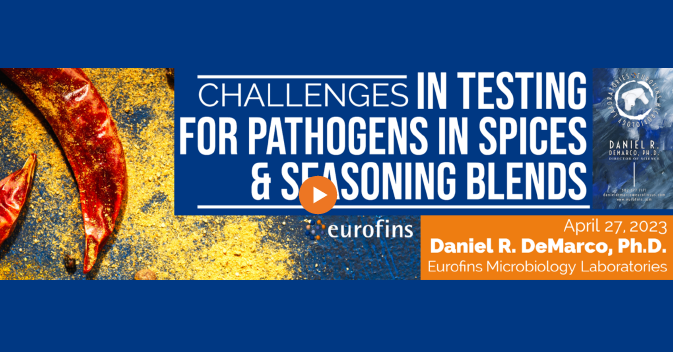Webinars
Search >>
On-Demand Webinars:
This case study details how Eurofins The National Food Lab was able to assist a Consumer Packaged Goods company in setting up a new product lifecycle management system.
Keywords:
Case Study
Food
After collecting your samples making sure that they arrive at the laboratory at the correct temperature is the main priority. This guide walks through FIVE key steps for you to follow.
Join Eurofins Senior Staff Scientist, Lukas Vaclavik, for a discussion about per- and poly-fluoroalkyl substances (PFAS) in the food industry. Original airdate July 19, 2023.
This OOS Response Guide breaks down best practices for preparation before an OOS result is received, environmental monitoring program OOS actions, product OOS actions, and follow-up actions to prevent the reoccurrence of contamination.
In this presentation, Dr. DeMarco illustrates how positive pathogen results can be used to make real improvements in processes, facilitating a safer production environment with lower overall contamination risks and safer food for the consumer. Original airdate July 12, 2023.
Are you incorporating novel or upcycled protein materials in your products? This handout describes a key issue surrounding traditional determination, calculation, and labeling of two compulsory nutrients (protein & carbohydrates) in the US Nutrition Facts Panel.
In this webinar Dr. Demarco, Associate Scientific Director of Eurofins Microbiology, discusses problems from the perspective of the spice manufacturer, rapid and conventional cultural methods most commonly used when testing for pathogens in spices, issues with testing methods and most commonly used approaches to circumvent them, as well as opportunities for improvements. Original airdate April 27, 2023.
Are you incorporating novel or upcycled protein materials in your products? If so join Mollie Van Alst for this webinar to learn more about the determination of protein and carbohydrates from that material. Original airdate March 30, 2023
Chemical and microbial exposure are the most common types of contamination during food processing. Understanding the sources of each type of contamination helps to effectively prevent problems before they arise. This infographic below explains various contamination sources in food, feed, and botanical products. These include residual solvents, storage issues, improper handling, and more.

















